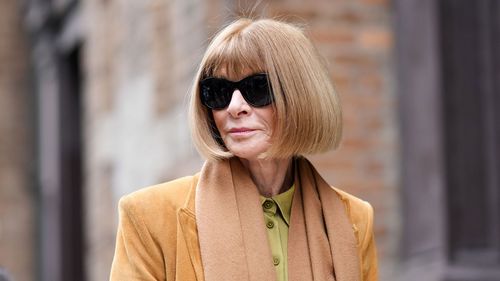Share this @internewscast.com
After nearly 40 years as the editor-in-chief of American Vogue, Anna Wintour is resigning and searching for a successor, as confirmed to CNN by the magazine’s publisher, Condé Nast.
Wintour broke the news to staffers on Thursday.
Although she’ll exit the top role at Vogue, she is not leaving Condé Nast altogether, but scaling back her duties.

She will remain on as the publisher’s global chief content officer as well as Vogue’s global editorial director.
The new role replacing her atop the storied American fashion magazine will be titled head of editorial content.
During her time as Vogue’s editor-in-chief, she revitalized the magazine, turning it from a progressively uninspired publication into a formidable entity that could both create and dismantle trends and designers.
While magazines shouldn’t just be evaluated by their covers, Wintour’s choices indicated her willingness to feature lesser-known individuals and break away from the traditional norms of luxury fashion publications.
Her first issue, published in November 1988, was fronted by Israeli model Michaela Bercu in a pair of stonewashed jeans â the first time that jeans had ever appeared on Vogue’s cover.

This set a tone for the hundreds of issues that followed, and Wintour would go on to make countless editorial decisions her predecessors would have considered unimaginable.
Gone were the days of controlled studio headshots; in their place came casual, outdoor, upper-body shots.
In 1992, she broke with a century-old Vogue tradition by featuring a man on the cover (in the form of Richard Gere, who appeared alongside Cindy Crawford, his wife at the time).
Though Wintour is most closely associated with Vogue, in 2020, she became Condé Nast’s chief content officer, overseeing all its titles globally, including Vanity Fair, Wired, GQ, Architectural Digest, Bon Appétit and Condé Nast Traveler.

Rather than a retirement announcement, Wintour’s shift, as well as the new role atop Vogue’s US edition, are part of a wider global restructuring of the company.
Still, the changing of the guards is a seismic shift for American Vogue, offering a coveted opening for fashion editors as well as the opportunity for the industry’s most influential publication to head in new directions.
Two years ago, Chioma Nnadi became the first Black woman to lead British Vogue as she succeeded Edward Enninful’s own history-making six-year run as the magazine’s first Black editor-in-chief.












